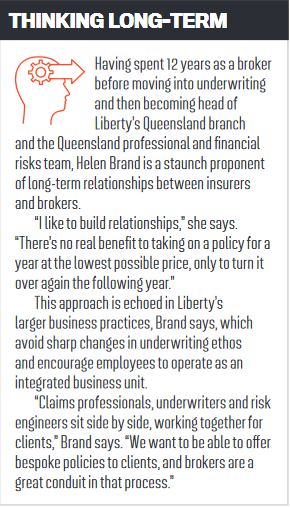

Halfway through 2020, there have already been enough major events around the world to populate the better part of a decade. Australia alone has seen major bushfires, flooding, the COVID-19 pandemic and signs of the country’s first recession in 30 years. Coupled with a hardening insurance market across a broad variety of sectors, brokers have been far from immune during this period, says Helen Brand, assistant vice president of professional and financial risks and Queensland branch manager at Liberty Specialty Markets.
“Brokers are dealing with challenges well beyond the usual day-to-day business,” she says. “They’re servicing heavily distressed clients, some of whom are also staring down tightening pricing models and Ts & Cs, as well as new exclusions.”
Still, Brand believes there’s significant room for brokers to come into their own and demonstrate their value during this period. In her view, the reaction to COVID-19 has served as an object lesson in how brokers can showcase their value. It’s an opportunity to get on the front foot, provide support and look at both present and future needs.
“Insurance is a numbers game, but there’s also a significant relational component at play,” Brand says. “Over the past year, we’d become increasingly aware of the importance of advising brokers around questions of culture and values. The financial stability of an entity is important, but without a solid culture in which employee feedback is valued, an entity can start to show strain. Our discussions with broker partners and clients place great importance on this aspect.”
Brand adds that Liberty aims not to be “too reactionary”. As an entity with deep experience and expertise in financial institutions and professional indemnity, Brand says Liberty is well aware of the importance of maintaining calm and poise in the face of wider world events.
“Insurance is a numbers game, but there’s also a significant relational component at play” Helen Brand, Liberty Specialty Markets
“As a mutual, consistency tends to be something that we do well,” she says. “Over the last two or three years, we’ve seen pricing in the professional and financial lines that we write rapidly increase to current levels. Some insurers either downscaled their risk appetite or simply withdrew from servicing those markets.”
One of the key advantages of working with a mutual, Brand says, is that even in uncertain times, brokers don’t have to worry that Liberty is going to suddenly disappear or exit the market overnight. While Liberty isn’t completely immune to wider market cycles, Brand notes that mutuals tend to be able to look at alternative ways of aiding clients in hardening markets or other unusual circumstances.
“It’s not just about pricing; it’s just as much about policy terms,” she explains. “Over the past year, Liberty has actually bound 20% more professional and financial lines policies in Australia than we did in the year prior, so we’re definitely committed and try to maintain a stable risk appetite.”
Grappling with risk
Brand credits a great deal of Liberty’s success to its in-house risk engineers and claims professionals. Working closely with brokers and clients, Liberty’s risk engineers are able to provide key insights into a client’s industry. That enables pricing and risk to be assessed with greater accuracy while also clearly demonstrating the rationale behind particular decisions and policies.
For example, Liberty is the only insurer in the Australian market with a risk engineer dedicated to professional indemnity for construction clients. Brand notes that while risk engineers are not a particularly new concept – they have long been tied to property insurance – they are not well known within the professional and fi nancial lines space.
“We’ve found that brokers and clients tend to open up more when they have someone in front of them who actually understands their industry,” she says. “They’re able to see the situation in a whole new light, and the risk engineer can provide insights into the wider context of pricing and clauses.”
“We’ve found that brokers and clients tend to open up more when they have someone in front of them who actually understands their industry” Helen Brand, Liberty Specialty Markets
Similarly, Liberty’s claims professionals do much more than just settle claims. “They meet clients when the underwriting process begins and are part of the complete life cycle of our clients’ journeys,” Brand says.

In light of the recession brought on by COVID-19, Brand is keenly aware of the risk of company collapse and, accordingly, expects to see a more active claims environment. Liberty is supporting brokers by providing question sets on COVID-19 to help generate information for underwriting and claims assessment.
“We haven’t put any broad-brush exclusions around COVID-19 on any professional and financial lines policies,” Brand says. “Clients need to be treated and assessed individually under these circumstances; we know that many of them have exceptional risk management and disclosure reporting, and we reflect that in our underwriting.”
Brand acknowledges that there has been considerable discussion around the prospect of insurers withdrawing and retracting from segments of the market, but she remains confident that this won’t be an issue for Liberty. Over the past 18 months, the organisation has significantly grown its financial institutions and professional indemnity books, taking on significantly more fund managers, certifiers and solicitors.
Additionally, Liberty’s D&O policy count has tripled in the last five years, and Side C cover is still being written under the right conditions. Seven new professional and financial lines underwriters have joined the Australian team so far in 2020, including three who have come on board while working from home during COVID-19.
“Clients are underwritten on the basis of a long-term relationship,” Brand says. “Client meetings and engagement are key to this longevity, ensuring that we understand and partner with each of our insureds.”
With insurers all around the world heavily aff ected, she adds, it’s critical to have a reliable partner. “We’ve been there when there has been a market dislocation, and we’ve stayed in the market. It’s rare for us to withdraw; we can have di cult conversations around coverage, exposures and pricing.”
Brand also points to Liberty’s various training and best-practice initiatives for brokers. “We work across a broad spectrum of engagement, collaboration and contact forums – white paper distribution, LinkedIn, virtual and face-to-face broker updates, to name a few,” she says. “We’re always eager to provide opportunities for up-and-coming brokers to make contact with more experienced brokers; by bringing them together, we give them the opportunity to network and impart experience.”
Ultimately, Liberty is committed to brokers and clients alike for the benefit of the wider industry. “We want the best possible outcome for everyone,” Brand says. “After all, as a mutual, it’s in our best interest to provide mutually benefi cial outcomes.”
